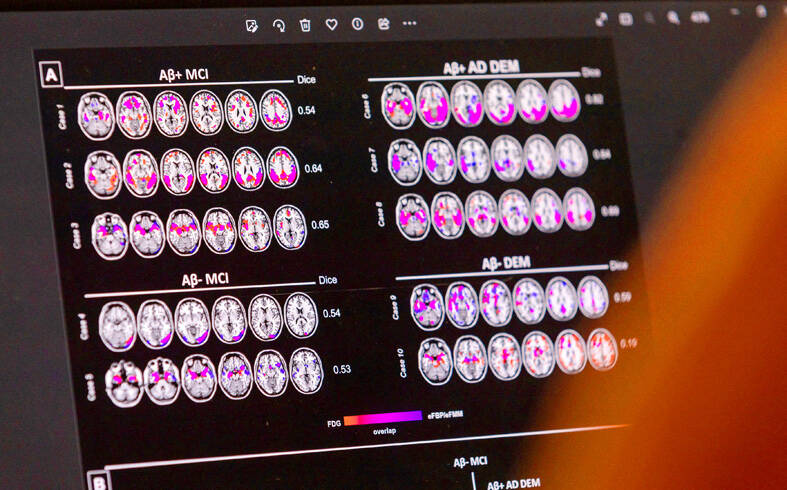Researchers from Japan’s Hiroshima University (HU) and Taipei Medical University (TMU) have called for regulations on human brain organoid research and applications.
“Human brain organoids are three-dimensional neural tissues derived from stem cells that can mimic some aspects of the human brain,” an HU news release published on Thursday said.
More than 55 million people around the world have dementia — that is one person every three seconds, a WHO report showed.

Photo: Denis Balibouse, Reuters
In Taiwan, one in every 13 people aged 65 or older and one in five people aged 80 or older have dementia.
While human brain organoid research could bring fresh hope to people with dementia or other brain diseases, researchers from HU and TMU looked into its potential challenges, and proposed a legal and ethical framework to regulate the development of human brain organoids in a research published in the Journal of Bioethical Inquiry last month.
HU’s Graduate School of Humanities and Social Sciences professor Tsutomu Sawai led the research and proposed five aspects of human brain organoids that could cause legal concerns: consciousness, legal status, consent, ownership and transplantation.
“One of the most-debated concerns is whether human brain organoids could become conscious,” the HU news release said.
Further discussion from an ethical and legal perspective is needed, Sawai said.
His research team is to hold a seminar on the issue at the National University of Singapore on Nov. 11 and 12.
Some researchers have been growing cerebral organoids to explore brain mechanisms such as neural development and disease formation, TMU’s Graduate Institute of Health and Biotechnology Law associate professor Lee Tsung-ling (李崇菱) said, who also participated in the research.
However, ethical concerns remain as brain organoids might become “conscious,” she said, adding that legal regulations still fall behind technological development.
For example, ownership disputes could arise between donors and researchers over the brain organoid research development and outcomes, Lee said.
Although human brain organoids are regarded as “property” just like regular human organs, they could be defined as a judicial person if they are integrated into an artificial intelligence system, she said.
Legal and ethical challenges could also emerge if the brain organoids are transplanted into living animal bodies or human bodies for further experiments and research, Lee added.
Additional reporting by CNA

An essay competition jointly organized by a local writing society and a publisher affiliated with the Chinese Communist Party (CCP) might have contravened the Act Governing Relations Between the People of the Taiwan Area and the Mainland Area (臺灣地區與大陸地區人民關係條例), the Mainland Affairs Council (MAC) said on Thursday. “In this case, the partner organization is clearly an agency under the CCP’s Fujian Provincial Committee,” MAC Deputy Minister and spokesperson Liang Wen-chieh (梁文傑) said at a news briefing in Taipei. “It also involves bringing Taiwanese students to China with all-expenses-paid arrangements to attend award ceremonies and camps,” Liang said. Those two “characteristics” are typically sufficient

A magnitude 5.9 earthquake that struck about 33km off the coast of Hualien City was the "main shock" in a series of quakes in the area, with aftershocks expected over the next three days, the Central Weather Administration (CWA) said yesterday. Prior to the magnitude 5.9 quake shaking most of Taiwan at 6:53pm yesterday, six other earthquakes stronger than a magnitude of 4, starting with a magnitude 5.5 quake at 6:09pm, occurred in the area. CWA Seismological Center Director Wu Chien-fu (吳健富) confirmed that the quakes were all part of the same series and that the magnitude 5.5 temblor was

The brilliant blue waters, thick foliage and bucolic atmosphere on this seemingly idyllic archipelago deep in the Pacific Ocean belie the key role it now plays in a titanic geopolitical struggle. Palau is again on the front line as China, and the US and its allies prepare their forces in an intensifying contest for control over the Asia-Pacific region. The democratic nation of just 17,000 people hosts US-controlled airstrips and soon-to-be-completed radar installations that the US military describes as “critical” to monitoring vast swathes of water and airspace. It is also a key piece of the second island chain, a string of

The Central Weather Administration has issued a heat alert for southeastern Taiwan, warning of temperatures as high as 36°C today, while alerting some coastal areas of strong winds later in the day. Kaohsiung’s Neimen District (內門) and Pingtung County’s Neipu Township (內埔) are under an orange heat alert, which warns of temperatures as high as 36°C for three consecutive days, the CWA said, citing southwest winds. The heat would also extend to Tainan’s Nansi (楠西) and Yujing (玉井) districts, as well as Pingtung’s Gaoshu (高樹), Yanpu (鹽埔) and Majia (瑪家) townships, it said, forecasting highs of up to 36°C in those areas